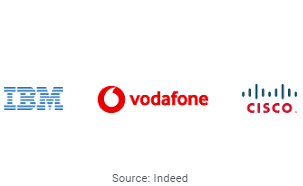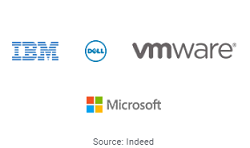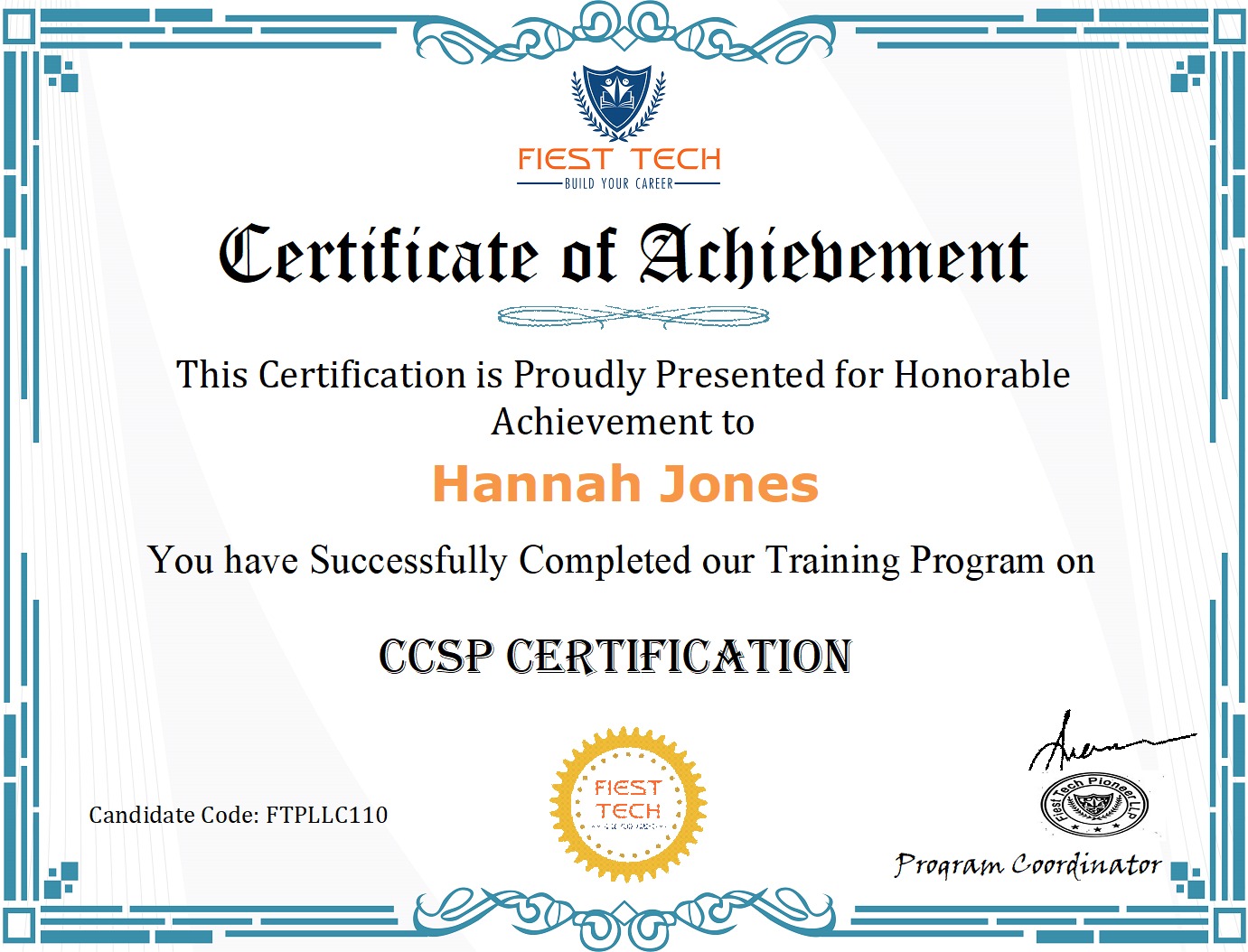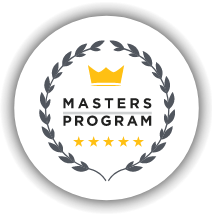CISSP Certification Training Course Overview
The CISSP certification training develops your expertise in defining the IT architecture and in designing, building, and maintaining a secure business environment using globally approved information security standards. The CISSP training covers industry best practices and prepares you for the CISSP certification exam held by (ISC)².
Cissp Certification Training Course Key Features
At Fiesttech, we value the trust of our patrons immensely. But, if you feel that this Cissp Certification Training Course does not meet your expectations, we offer a 7-day money-back guarantee. Just send us a refund request via email within 7 days of purchase and we will refund 100% of your payment, no questions asked!
- CISSP Exam Voucher Included
- 8X higher interaction in live online classes conducted by industry experts
- 5 simulation test papers to prepare you for CISSP certification
- Offers the requisite 30 CPEs for taking the CISSP examination
Skills Covered
- Security and risk management
- Asset security Security architecture and design
- Cryptography OSI and TCPIP models
- IP addresses
- Network security
- Identity and access management
- Security assessment and testing
- Software development security
Benefits
CISSP Certification Training Course Overview
A CISSP certification validates your skills in IT security. Cybersecurity Ventures predicts a total of 3.5 million Cyber Security jobs by 2022. The global Cyber Security market is expected to reach USD $282.3 Billion by 2024, growing at a rate of 11.1-percent annually.
Annual Salary
Hiring Companies

Annual Salary
Hiring Companies

Annual Salary
Hiring Companies

Annual Salary
Hiring Companies

GO AT YOUR OWN PACE
Training Options
Explore all of our training options and pick your suitable ones to enroll and start learning with us! We ensure that you will never regret it!
CISSP Course Curriculum
Eligibility
The CISSP course is the most globally recognized professional requirement in the IT Security domain. This CISSP training is best suited for those at the intermediate level of their career including; security consultants/managers, IT directors/managers, security auditors/architects, security system engineers, CIOs, and network architects.
Pre-requisites
To obtain your CISSP (certified information systems security professional) certification, you must have a minimum of five years of full-time professional work experience in two or more of the 8 domains of the CISSP – (ISC)² CBK 2021. A qualified individual with less than five years of experience will receive the (ISC)² associate title.
Course Content
Live Course
Self Paced
-
2.01 - 1.01 Introduction
1:13 -
2.02 - 1.02 Introduction to Security and Risk Management
4:39 -
2.03 - 1.03 Understand, Adhere to, and Promote Professional Ethics
01:20 -
2.04 - 1.04 Knowledge Check
1:30 -
2.05 - 1.05 Understand and Apply Security Concepts
1:56 -
2.06 - 1.06 Evaluate and Apply Security Governance Principles
00:50 -
2.07 - 1.07 Goals, Mission, and Objectives
00:50 -
2.08 - 1.08 Control Frameworks, Due Care, and Due Diligence
1:30 -
2.09 - 1.09 Knowledge Check
00:30 -
2.10 - 1.10 Determine Compliance and Other Requirements
01:20 -
2.11 - 1.11 Understand Legal and Regulatory Issues that Pertain to Information Security in a Holistic Context
00:40 -
2.12 - 1.12 Types of Intellectual Properties (IP) Law
00:30 -
2.13 - 1.13 OECD Principles, GDPR, and Data Protection principles
00:50 -
2.14 - 1.14 Data Protection Principles
00:40 -
2.15 - 1.15 Understand Requirements for Investigation Types
01:20 -
2.16 - 1.16 Knowledge Check
00:50 -
2.17 - 1.17 Develop, Document, and Implement Security Policy, Standards,Procedures, and Guidelines
1:30 -
2.18 - 1.18 Knowledge Check
00:30 -
2.19 - 1.19 Need for Business Continuity Planning (BCP)
01:20 -
2.20 - 1.20 Business Continuity Planning Phases
1:30 -
2.21 - 1.21 Business Impact Analysis
00:40 -
2.22 - 1.22 Identify Preventive Controls
00:30 -
2.23 - 1.22 Identify Preventive Controls
00:30 -
2.24 - 1.23 Knowledge Check
00:50 -
2.25 - 1.24 Contribute and Enforce Personnel Security Policies and Procedures
01:20 -
2.26 - 1.25 Introduction to Risk Management Concepts
1:30 -
2.27 - 1.26 Risk Analysis
00:40 -
2.28 - 1.27 Risk Analysis and Assessment
1:30 -
2.29 - 1.28 Countermeasure Selection
1:56 -
2.30 - 1.29 Risk Handling and Security Control Assessment
01:20 -
2.31 - 1.30 Security Control Assessment (SCA)
00:50 -
2.32 - 1.31 Risk Monitoring and Continuous Improvement
00:30 -
2.33 - 1.32 Knowledge Check
00:40 -
2.34 - 1.33 Understand and Apply Threat Modeling Concepts and Methodologies
01:20 -
2.35 - 1.34 Threat Modeling Steps
1:30 -
2.36 - 1.35 DREAD Rating
00:50 -
2.37 - 1.36 Knowledge Check
00:40 -
2.38 - 1.37 Apply Supply Chain Risk Management (SCRM) Concepts
1:30 -
2.39 - 1.38 Third-Party Management and Risks
00:50 -
2.40 - 1.39 Third-Party Risk Management Life Cycle
00:30 -
2.41 - 1.40 Knowledge Check
00:50 -
2.42 - 1.41 Establish and Maintain a Security Awareness, Education, and Training Program
01:20 -
2.43 - 1.42 Program Effectiveness: Evaluation
00:40 -
2.44 - 1.43 Knowledge Check
1:30 -
2.45 - 1.44 Quick Recap
00:30 -
2.46 - 1.45 Knowledge Check
01:20
-
3.01 - 2.01 Introduction
00:40 -
3.02 - 2.02 Introduction to Asset Security
00:30 -
3.03 - 2.03 Identify and Classify Information and Assets
1:30 -
3.04 - 2.04 Information Classification Objectives
00:50 -
3.05 - 2.05 Knowledge Check
00:40 -
3.06 - 2.06 Establish Information and Asset Handling Requirements
00:30 -
3.07 - 2.07 Provision Resources Securely
00:50 -
3.08 - 2.08 Manage Data Life Cycle
1:30 -
3.09 - 2.09 Data Life Cycle: Create, Store, and Use
00:40 -
3.10 - 2.10 Data Life Cycle: Share, Archive, and Destroy
00:30 -
3.11 - 2.11 Data Remanence and Data Destruction
00:40 -
3.12 - 2.12 Knowledge Check
01:20 -
3.13 - 2.13 Ensure Appropriate Asset Retention
1:30 -
3.14 - 2.14 Data and Data Security Controls
00:50 -
3.15 - 2.15 How to Select Controls
00:30 -
3.16 - 2.16 Digital Rights Management (DRM)
01:20 -
3.17 - 2.17 Data Loss Prevention (DLP)
01:20 -
3.18 - 2.18 Quick Recap
01:20 -
3.19 - 2.19 Knowledge Check
00:40
-
4.01 - 3.01 Introduction
00:30 -
4.02 - 3.02 Introduction to Security Engineering
00:50 -
4.03 - 3.03 Research, Implement, and Manage Engineering Processes Using
1:30 -
4.04 - 3.04 Trust but Verify and Zero Trust
00:50 -
4.05 - 3.05 Privacy by Design
01:20 -
4.06 - 3.06 Knowledge Check
1:30 -
4.07 - 3.07 Understand the Fundamental Concepts of Security Models
00:40 -
4.08 - 3.08_State Machine Model, Multilevel Lattice Model, Non-Interference Model, and Information Flow Model
00:50 -
4.09 - 3.09 Types of Security Models
6:20 -
4.10 - 3.10 Composition Theories, Covert Channels, and Open and Closed Systems
01:20 -
4.11 - 3.11 Knowledge Check
00:30 -
4.12 - 3.12 Select Controls Based on System Security Requirements
1:30 -
4.13 - 3.13 Security Capabilities of Information Systems
1:56 -
4.14 - 3.14 Knowledge Check
00:40 -
4.15 - 3.15 Assess and Mitigate the Vulnerabilities of Security Architectures
00:30 -
4.16 - 3.16 SCADA
00:50 -
4.17 - 3.17 Security Concerns of ICS
01:20 -
4.18 - 3.18 Cloud Computing
00:40 -
4.19 - 3.19 Categorization of Cloud
1:56 -
4.20 - 3.20 Internet of Things
1:30 -
4.21 - 3.21 Fog and Edge Computing
1:56 -
4.22 - 3.22 Knowledge Check
00:30 -
4.23 - 3.23 Select and Determine Cryptographic Solutions
00:50 -
4.24 - 3.24 Cryptosystem Elements
01:20 -
4.25 - 3.25 Encryption Methods
1:30 -
4.26 - 3.26 Data Encryption Standards
00:40 -
4.27 - 3.27 Output Feedback, Counter, and Triple DES
00:30 -
4.28 - 3.28 Advanced Encryption Standards
01:20 -
4.29 - 3.29 Asymmetric Cryptography
1:56 -
4.30 - 3.30 Public Key Infrastructure
00:50 -
4.31 - 3.31 PKI Certificate and Processes
1:30 -
4.32 - 3.32 PKI Process: Steps
00:40 -
4.33 - 3.33 Hashing, MAC, and Digital Signatures
01:20 -
4.34 - 3.34 Key Management Principles
00:30 -
4.35 - 3.35 Knowledge Check
00:50 -
4.36 - 3.36 Methods of Cryptanalytic Attacks
1:30 -
4.37 - 3.37 Knowledge Check
01:20 -
4.38 - 3.38 Apply Security Principles to Site and Facility Design
1:56 -
4.39 - 3.39 Design Site and Facility Security Controls
00:30 -
4.40 - 3.40 Personnel Access Controls
1:56 -
4.41 - 3.41 Environmental Security Controls
00:40 -
4.42 - 3.42 Classes of Fires
1:56 -
4.43 - 3.43 Other Security Controls
1:56 -
4.44 - 3.44 HVAC, Power Supply, and Training
1:56 -
4.45 - 3.45 Knowledge Check
00:50 -
4.46 - 3.46 Quick Recap
1:30 -
4.47 - 3.47 Knowledge Check
00:40
-
5.01 - 4.01 Introduction
00:50 -
5.02 - 4.02 Introduction to Communications and Network Security
01:20 -
5.03 - 4.03 Assess and Implement Secure Design Principles
1:56 -
5.04 - 4.04 Physical Layer and Data Link Layer
00:30 -
5.05 - 4.05 Network Layer
1:30 -
5.06 - 4.06 Transport Layer
00:40 -
5.07 - 4.07 Session Layer and Presentation Layer
1:56 -
5.08 - 4.08 Application Layer and Protocols
00:30 -
5.09 - 4.09 Knowledge Check
00:50 -
5.10 - 4.10 IP Addressing
01:20 -
5.11 - 4.11 IPv6 and Its Address Structures
1:30 -
5.12 - 4.12 Knowledge Check
1:56 -
5.13 - 4.13 Internet Security Protocol(IPsec)
1:56 -
5.14 - 4.14 IPsec Security Protocols
00:40 -
5.15 - 4.15 Secure Access Protocols
1:56 -
5.16 - 4.16 Implementation of Multilayer Protocol, Fiber Channels, and Micro-Segmentation
00:50 -
5.17 - 4.17 SDN and Wireless Technologies
00:30 -
5.18 - 4.18 Cellular Network and CDN
1:56 -
5.19 - 4.19 Knowledge Check
1:56 -
5.20 - 4.20 Secure Network Components
01:20 -
5.21 - 4.21 Understand Network Access Control (NAC) and Endpoint Security
1:30 -
5.22 - 4.22 Knowledge Check
00:40 -
5.23 - 4.22 Knowledge Check
1:56 -
5.24 - 4.23 Implement Secure Communication Channels
00:30 -
5.25 - 4.24 Application-Level Gateway, Circuit-Level Gateway, and Network Security Terms
01:20 -
5.26 - 4.25 Remote Access Technologies
1:30 -
5.27 - 4.26 VPN Protocols
1:56 -
5.28 - 4.27 VPN Protocols: Comparison
00:50 -
5.29 - 4.28 Multimedia Collaboration, Network Function Virtualization, and Network Attacks
1:56 -
5.30 - 4.29 Quick Recap
00:40 -
5.31 - 4.30 Knowledge Check
00:30
-
7.01 - 5.01 Introduction
01:20 -
7.02 - 5.02 Introduction to Identity and Access Management (IAM)
1:56 -
7.03 - 5.02 Introduction to Identity and Access Management (IAM)
00:50 -
7.04 - 5.03 Control Physical and Logical Access to Assets
1:56 -
7.05 - 5.04 Manage Identification and Authentication of People Devices and Services
1:56 -
7.06 - 5.05 Biometrics and Accuracy Measurement
1:56 -
7.07 - 5.06 Passwords and Its Types
1:56 -
7.08 - 5.07 Tokens, Token Devices, and Authorization
1:30 -
7.09 - 5.08 Federated Identity Management (FIM) and Credential Management System
1:56 -
7.10 - 5.09 Single Sign-On (SSO) and Just-In-Time (JIT)
1:56 -
7.11 - 5.10 Knowledge Check
00:40 -
7.12 - 5.11 Federated Identity with a Third-Party Service
00:30 -
7.13 - 5.12 Implement and Manage Authorization Mechanisms
1:56 -
7.14 - 5.13 Attribute-Based Access Control (ABAC) and Risk-Based Access Control
1:56 -
7.15 - 5.14 Knowledge Check
1:56 -
7.16 - 5.15 Manage the Identity and Access Provisioning Life Cycle
00:50 -
7.17 - 5.16 Privilege Escalation
03:20 -
7.18 - 5.17 Implement Authentication Systems
1:56 -
7.19 - 5.18_Kerberos and Its Steps, RADIUS, TACACS, and TACACS Plus
1:56 -
7.20 - 5.19 Quick Recap
01:20 -
7.21 - 5.20 Knowledge Check
1:30
-
8.01 - 6.01 Introduction
00:30 -
8.02 - 6.02 Introduction to Security Assessment and Testing
00:40 -
8.03 - 6.03 Design and Validate Assessment, Test, and Audit Strategies
1:56 -
8.04 - 6.04 SOC Reports and Security Assessments
00:50 -
8.05 - 6.05 Internal Audit and Assessment
1:56 -
8.06 - 6.06 External Audit and Assessment
01:20 -
8.07 - 6.07 Third-Party Audit and Assessment
1:30 -
8.08 - 6.08 Knowledge Check
00:40 -
8.09 - 6.09 Vulnerability Assessment
00:30 -
8.10 - 6.10 Network Discovery Scan
00:50 -
8.11 - 6.11 Network Vulnerability Scan and Web Vulnerability Scan
1:56 -
8.12 - 6.12 Penetration Testing
01:20 -
8.13 - 6.13 Penetration Testing Process and Testing Types
1:30 -
8.14 - 6.14 Log Management and Review
00:40 -
8.15 - 6.15 Security Testing in SDLC
00:30 -
8.16 - 6.16 Code Review and Testing
00:50 -
8.17 - 6.17 Testing Methods
01:20 -
8.18 - 6.18 Interface Testing
1:30 -
8.19 - 6.19 Knowledge Check
00:40 -
8.20 - 6.20 Collect Security Process Data
01:20 -
8.21 - 6.21 KPI Process
1:30 -
8.22 - 6.22 Knowledge Check
00:50 -
8.23 - 6.23 Analyze Test Output and Generate Report
00:50 -
8.24 - 6.24 Quick Recap
00:40 -
8.25 - 6.25 Knowledge Check
00:30
-
9.01 - 7.01 Introduction
1:30 -
9.02 - 7.02 Introduction to Security Operations
00:40 -
9.03 - 7.03 Understand and Comply with Investigations
01:20 -
9.04 - 7.04 Digital Forensics
1:56 -
9.05 - 7.05 Understand the Digital Evidences
00:30 -
9.06 - 7.06 Knowledge Check
00:50 -
9.07 - 7.07 Conduct Logging and Monitoring Activities
01:20 -
9.08 - 7.08 Knowledge Check
1:30 -
9.09 - 7.09 Continuous Monitoring
00:30 -
9.10 - 7.10 Digital Forensics Tools, Tactics, Procedures, Artifacts, and UEBA
00:40 -
9.11 - 7.10 Digital Forensics Tools, Tactics, Procedures, Artifacts, and UEBA
00:50 -
9.12 - 7.11 Knowledge Check
01:20 -
9.13 - 7.12 Perform Configuration Management
1:30 -
9.14 - 7.13 Apply Foundational Security Operation Concepts
00:40 -
9.15 - 7.14 Identity and Access Management with Various Types of Accounts
1:56 -
9.16 - 7.15 Apply Resource Protection
00:30 -
9.17 - 7.16 Controls for Protecting Assets
00:50 -
9.18 - 7.17 Conduct Incident Management
01:20 -
9.19 - 7.18 Understand Incident Response Life Cycle
00:40 -
9.20 - 7.19 Knowledge Check
1:30 -
9.21 - 7.20 Operate and Maintain Detective and Preventive Measures
00:30 -
9.22 - 7.21 Understand Anti-Malware Systems, AI, Machine Learning, and Deep Learning
00:50 -
9.23 - 7.22 Implement and Support Patch and Vulnerability Management
01:20 -
9.24 - 7.23 Understand and Participate in Change Management Processes
1:56 -
9.25 - 7.24 Implement Recovery Strategies
1:30 -
9.26 - 7.25 Types of Recoveries
00:40 -
9.27 - 7.26 Operational Recovery
00:30 -
9.28 - 7.27 Recovery Partner Strategies
00:50 -
9.29 - 7.28 Redundancy and Fault Tolerance
01:20 -
9.30 - 7.29 Knowledge Check
1:30 -
9.31 - 7.30 Implement Disaster Recovery (DR) Processes
00:40 -
9.32 - 7.31 Knowledge Check
00:30 -
9.33 - 7.32 Test Disaster Recovery Plans (DRP)
00:50 -
9.34 - 7.33 Knowledge Check
01:20 -
9.35 - 7.34 Participate in Business Continuity (BC) Planning and Exercises
1:30 -
9.36 - 7.35 Implement and Manage Physical Security
00:40 -
9.37 - 7.36 Importance of Lighting in Security Management
00:30 -
9.38 - 7.37 Access Control
01:20 -
9.39 - 7.38 Knowledge Check
00:40 -
9.40 - 7.39 Address Personnel Safety and Security Concerns
1:30 -
9.41 - 7.40 Quick Recap
00:50 -
9.42 - 7.41 Knowledge Check
00:30
-
10.01 - 8.01 Introduction
00:50 -
10.02 - 8.02 Introduction to Software Development Security
01:20 -
10.03 - 8.03 Integrate Security in the Software Development Life Cycle
1:30 -
10.04 - 8.04 Software Development Models
01:20 -
10.05 - 8.05 Extreme Programming Model
1:30 -
10.06 - 8.06 DevOps and DevSecOps
1:56 -
10.07 - 8.07 CMM and SAMM
2:30 -
10.08 - 8.08 Change Management and Integrated Product Team (IPT)
01:20 -
10.09 - 8.09 Knowledge Check
1:56 -
10.10 - 8.10 Security Controls in Software Development Ecosystems
00:40 -
10.11 - 8.11 Other Security Controls in Software Development Ecosystems
00:30 -
10.12 - 8.12 Software Configuration Management (SCM)
00:50 -
10.13 - 8.13 Database and Data Warehousing Environments
00:40 -
10.14 - 8.14 Knowledge Check
1:56 -
10.15 - 8.15 Assess the Effectiveness of Software Security
00:30 -
10.16 - 8.16 Software Security and Assurance: Granularity of Controls and Separation of Environments
00:50 -
10.17 - 8.17 Software Security and Assurance: TOC or TOU, Prevention of Social Engineering, Backup, Software Forensics, Cryptography
00:40 -
10.18 - 8.18 Software Security and Assurance: Password Protection, Mobile Mode Controls, and Sandbox
1:30 -
10.19 - 8.19 Software Security and Assurance: Strong Language Support, XML, and SAML
00:30 -
10.20 - 8.20 Assessing the Effectiveness of Software Security
00:50 -
10.21 - 8.21 Knowledge Check
01:20 -
10.22 - 8.22 Assess Security Impact of Acquired Software
1:56 -
10.23 - 8.23 Free and Open Source Software
01:20 -
10.24 - 8.24_Knowledge Check
00:40 -
10.25 - 8.25 Define and Apply Secure Coding Guidelines and Standards
1:30 -
10.26 - 8.26 Web Application Environment
00:30 -
10.27 - 8.27 Knowledge Check
00:50 -
10.28 - 8.28 Quick Recap
1:56 -
10.29 - 8.29 Knowledge Check
00:40

Cissp Certification Training Course Exam & Certification
You must pass the CISSP exam to become certified. The CISSP exam is a computer-based test (CBT) administered at Pearson VUE Testing centres around the world.
Link:
Exam Pass Guarantee*: Except for Indian Subcontinent, and Africa
Fiest Tech offers Exam Pass Guarantee to our students who completes CISSP Certification training. We offer a voucher (free of charge) to the students to retake the exam in case they fail ISC2 CISSP final exam.
T&C for claiming the retake voucher as a part of exam pass guarantee:
- Attend at least one complete instructor-led class
- Score over 85% in at least 3 of the 5 test papers provided along with the course
- Must give final exam within 30 days from the date of course completion
- Produce exam failure notice received from ISC2
- *Due to COVID-19 this has been increased to 365 days from the date of enrollment. This update is only valid for enrollment between 1st Oct 2020 to 31st December 2021.
This CISSP training is intended for professionals who want to acquire the credibility and mobility to advance within their current Information Security careers. To claim the CISSP certificate from ISC2 it is mandatory that you have at least 5 years of recent full-time professional work experience in 2 or more of the 8 domains of the CISSP – CBK 2021. Incase you do not have the required five years of experience, you will be awarded an ISC2 associate title which will be replaced with the CISSP certificate after you gain and submit proof of your experience.
Online Classroom:
- Attend one complete batch.
- Complete one simulation test with a minimum score of 60%.
Online Self learning:
- Complete 85% of the course.
- Complete one simulation test with a minimum score of 60%.
The passing score for the CISSP Certification exam is 700.
- Review exam availability by credential.
- Visit the Pearson VUE website, create an account, and review the Pearson VUE NDA.
- Select the most convenient test center location.
- Select an appointment time.
- Pay for your exam.
Yes, we do provide assistance for the exam application process. Please contact Help and Support for more information.
You will have one attempt to pass the exam.
It will take 2-4 weeks to get the results.
CISSP Certification is valid for three years.
If you fail, you won’t be able to apply for re-evaluation
If you don’t pass the exam the first time, you can retest after 30 days.
The CISSP examination can be scheduled within 6 months from the date of enrolment with Fiest Tech. Once you are ready to take the exam, contact Fiest Tech and you will receive an exam voucher code. You will need to complete the examination within a year from the day we issue the exam voucher.
Note: Due to the COVID-19 pandemic around the world we have updated our exam pass guarantee validity to 365 days from the date of enrollment. This update is only valid for enrollment between 1st Oct 2020 to 31st March 2021.
You will receive your certification via email 4-6 weeks after you receive your exam results email.
Our certification training is designed for you to pass the exams on your first attempt. With a hands-on learning approach and Global Learning Framework, the training not only gives you the confidence to pass the exam, but also helps you retain knowledge beyond the exam.
Fiest Tech provides recordings of each class so you can review them as needed before the next session. With Flexi-pass, Fiest Tech gives you access to as many as 15 sessions for 90 days.
Please click the below link for information regarding the booking process.
Yes, we provide 1 practice test as part of our course to help you prepare for the actual certification exam. You can try this Free CISSP Exam Prep Practice Test to understand the type of tests that are part of the course curriculum.

FAQS
Cissp Certification Training Course Course FAQs
Terms and Conditions:
Our training comes with a 100% money-back guarantee. Fiest Tech believes in our highly effective blended learning methodology and its ability to provide learners with the knowledge and confidence to pass the CISSP exam in the first attempt. If you do not pass the CISSP exam on the first attempt, Fiest tech will refund the course price to you.
To ensure your success, we strongly recommend that you take the CISSP exam within a week of the course completion date—or a maximum of 45 days from the completion of the online training. This way, the course materials will be fresh in your mind.
Note: Due to the COVID-19 pandemic around the world we have updated our exam pass guarantee validity to 365 days from the date of enrollment. This update is only valid for enrollment between 1st Oct 2020 to 31st December 2021.
CISSP Exam Attempts:
| Attempt | Time Frame | Result | Retake |
| First |
Within 6 months (180 days) from enrollment date *Due to COVID-19 this has been updated to 365 days from the date of enrollment |
Did Not Pass | Retake exam voucher provided |
Terms and Conditions:
This money-back guarantee applies only to Fiest Tech CISSP blended learning. It is not applicable for Fiest Tech Self-Paced Learning CISSP course. The guarantee is valid only for participants who have paid the entire enrollment fee.
The guarantee becomes void if:
- Participants do not take the CISSP examination within 45 days of unlocking the certificate.
- Participants do not maintain 100% attendance during the training sessions.
- Participants fail to score at least 80% in at least 2 simulation tests available at educadmy.com
- Participants fail to book their exam within 6 months from the date of enrollment
- Participants do not follow the instructions of the trainer and do not complete the exercises given during the training.
- Participants do not submit the required documents to educadmy.
- Participants failed to request a refund within 15 days of receiving their results
Offered by the prestigious (ISC)2, the CISSP Course is one of the world’s most valued information security certifications. There are over 131,000 CISSP certification holders across the world and most of them earn an average annual salary of USD 131,030. The demand for skilled cyber security professionals is high, and getting CISSP certified can give you a competitive edge among peers
CISSP certification can be pursued only if you have at least five years of experience in IT security. As such, CISSP will increase your credibility and open your doors to many high-paying cyber security jobs in the market. CISSP meets the strict conditions of the ANSI/ISO/IEC 17024 standard and also approved by the US Department of Defense (DoD) which further increases your employment chances.
All our highly-qualified trainers are CISSP certified with more than 15 years of experience working in the domain.
Wipro Technologies, IBM, JP Morgan Chase, Deloitte, Amazon, and Google are the top companies that hire CISSP certification holders
After successful completion of the CISSP training, you will be awarded the course completion certificate along with the 30 hours CPE's certificate from Fiest Tech.
Related Programs
Cyber Security Related Programs





